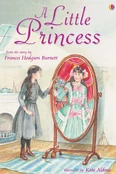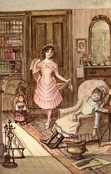Sarah Crewe is the main protagonist of “A Little Princess” by Frances Hodgson Burnett.
History[]
In the 19th century, Sara Crewe was raised in India (then part of the British Empire) by her father, Captain Ralph Crewe. Her French mother died when Sara was still a baby. When Sara is seven, she must attend a boarding school in London, the private school of Miss Minchin.
The Captain Crewe, a very wealthy man, insisted on Sara having a big room for herself, a big wardrobe (which included lace and silk, unusual for such a young child), a carriage drawn by a pony, her own French chamber maid (Mariette), and a large library. Sara could have been a spoiled brat, but despite all her possessions, she's a charming, nice, spirited young lady. She is intelligent (she speaks perfect French thanks to her mother's lineage) and well-read.
She's also very imaginative, and thinks dolls are secretly alive, notably her favorite one, Emily. Her father gave it to Sara in order to be her confidante, before he left. Sara also thinks every girl is a princess, and is very eager to act exactly as she if she was one. As such, she's very friendly and helpful towards all those less lucky than her. She befriends Ermengarde, a lonely, struggling student. She is protective of Lottie, the youngest pupil in the academy who lost her mother (Sara suggests that she will become her new mother). She also is kind to Becky, a servant who is Sara's age and buys her food as Becky is underfed. She tells stories that captivate her schoolmates and Becky.
After four years, Captain Crewe announce he has just bought a diamond mine with a friend, and hopes to become even richer. Unfortunately, on the day of Sara's twelfth birthday, arrive the news of Captain Crewe's death (of malaria); and that his mine is actually worthless. Sara has no other family and her time at the school has created a large debt owed to Miss Minchin. Miss Minchin allows Sara to stay as a servant to work off the debt and so that she isn't homeless. She also acts as a French teacher for the youngest pupils.
Sara's possessions are sold and her maid dismissed. She's only allowed to keep her simplest dresses and Emily. She now sleeps in an attic room, next to Becky. Sara's tasks (shopping and cleaning) are hard and like Becky, she's often deprived of food. Everyone is rude and harsh to her (especially the cook, Miss Minchin, and Lavinia, the local brat who was jealous of her). Everyone except Ermengarde, Lottie, and Becky. Sara invents a story, where she and Becky are prisoners in the Bastille.
She continues to think as princess and help those in need, like Anne, a poor beggar little girl. One day, Sara find a coin in the street and buys six small bread rolls, keeping one for herself and offering the others to Anne. This kindness is noticed by the new neighbor of the boarding school, Mr Carrisford, a rich and ill man. He allowd his Indian servant, Ram Dass, to secretly bring furniture, food, heating, and finally clothes to Sara's room, improving Sara and Becky.
She continues to think as princess and help those in need, like Anne, a poor beggar little girl. One day, Sara find a coin in the street and buys six small bread rolls, keeping one for herself and offering the others to Anne. This kindness is noticed by the new neighbor of the boarding school, Mr. Carrisford, a rich man in poor health. He allows his Indian servant, Ram Dass, to secretly bring furniture, food, heating, and finally clothes to Sara's room, improving Sara and Becky's lives.
Sara comes to Mr. Carrisford's home, with his little monkey that Sara just found. By coincidence, she revealed she lived in India and that her last name is Crewe. Shocked, Mr. Carrisford reveal he was Captain Crewe's friend.
Sara comes to Mr. Carrisford's home, with his little monkey that Sara just found. By coincidence, she revealed she lived in India and that her last name is Crewe. Shocked, Mr. Carrisford reveal he was Captain Crewe's friend and caught malaria too. When he was cured, he learned that the Captain was dead, but the mine was not worthless as initially thought: it contains millions of diamonds. Mr. Carrisford then searched for Ralph Crewe's daughter for two years, having no idea where she was.
He becomes Sara's tutor, and the latter regained her wealth. She also took Becky with her as her lady in waiting. Miss Minchin learned all of this and angrily told Sara that she "could be a princess again". "I've always tried to act like one" answered Sara.
Personality[]
Sara is a cheerful, intelligent, kind and generous girl. She's so caring and compassionate that she cannot bear to see someone suffering near her. She keeps this brave and optimistic attitude even when she falls on hard times. Adaptations sometimes made her submissive, but actually she can be sassy sometimes, like when Miss Minchin assure she actually like her( after Sara have her fortune back): "Really? I did not noticed". Her princess game helped Sara to keep her dignity all along, sometimes comparing herself to a fallen royal, kept in prison during French revolution. To her, being a princess was much more to just wear a crown and a nice dress; it's a philosophy of life. Sara's strong imagination was what helped her to cope with her life too, saying "everything is a story".
Quotes[]
- “Whatever comes," she said, "cannot alter one thing. If I am a princess in rags and tatters, I can be a princess inside. It would be easy to be a princess if I were dressed in cloth of gold, but it is a great deal more of a triumph to be one all the time when no one knows it.”
- “I am a princess. All girls are. Even if they live in tiny old attics. Even if they dress in rags, even if they aren’t pretty, or smart, or young. They’re still princesses.”
- “It's true," she said. "Sometimes I do pretend I am a princess. I pretend I am a princess, so that I can try and behave like one.”
- “All women are princesses, it is our right.”
Trivia[]
- Sara appears in the novel A little princess by Frances Burnett, and in the adaptations of it.
- Her name means princess in Hebrew.
- Her kingdom is undefined and she can be considered as self-proclaimed. At the beginning and the end of her story, she's as rich as many princesses are.
- There's been many adaptations of her story, including 1939 and 1995 movies, the 1985 anime, and the 2009 Japanese drama. Shoukou no strain is a loose adaptation as this anime present Sara as a pilot of a giant robot, who use the doll Emily as a secret weapon; the resemblance ends with names here.
- It been adapted in a manga, as well, and a comics (since 2009) that is a steampunk version (notably, Mariette, Emily and Amelia, Miss Minchin 's sister, are automatons in that version). It did not end where the novel ended, and went on with an adult Sara, who works as an automatons engineer.
- Shirley Temple played the role in 1939, and Liesel Matthews in 1995.
- The Japanese drama present Seira (Sara) as slighty older (around 16) as it modernize the story and transplant it in Japan: nowadays you can legally work at 16, but not before.
- Some adaptations, like the 1985 anime, sometimes present Sara as a shy, submissive girl as discretion and giving apologies is very valued in Japanese society. Occidental viewers came to dislike Sara for that reason, but the novel version was more sassy.
- Frances Hodgson Burnett, the author, saw her own family fell on hard times when she was a little girl, and said experience inspired her the book.















